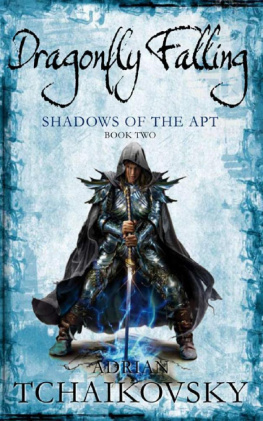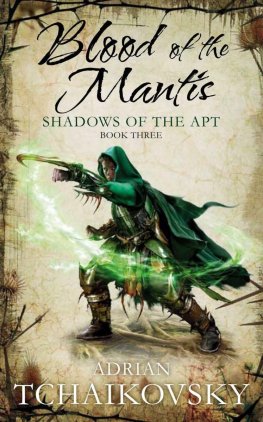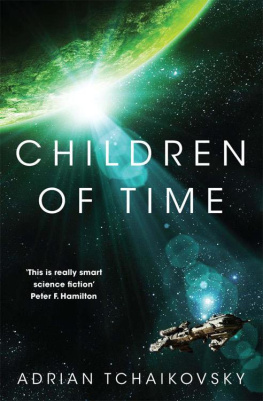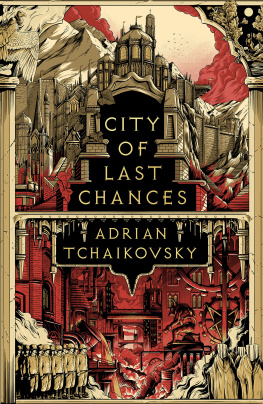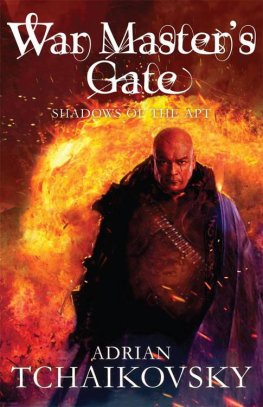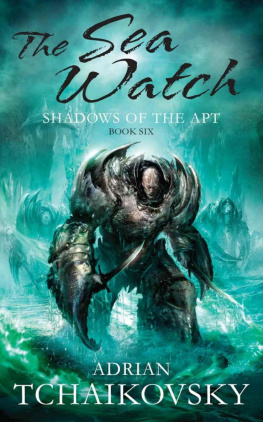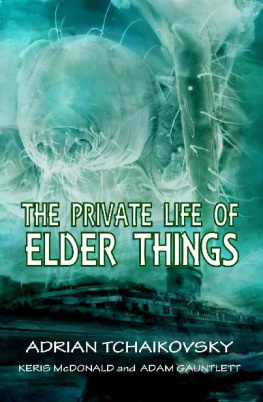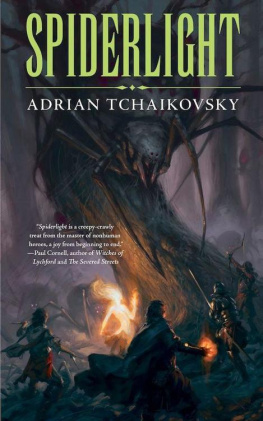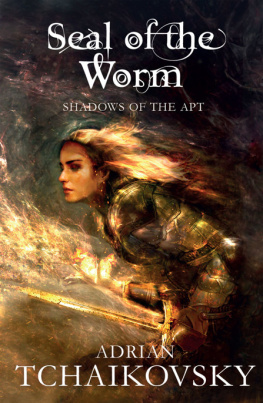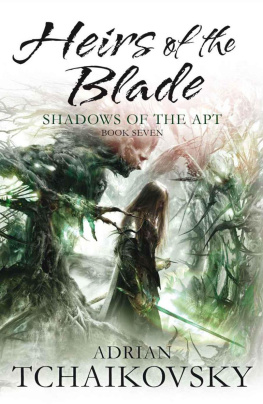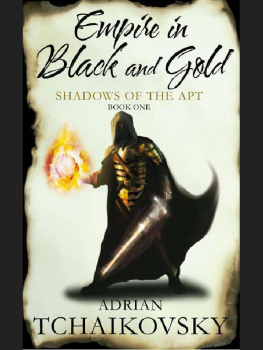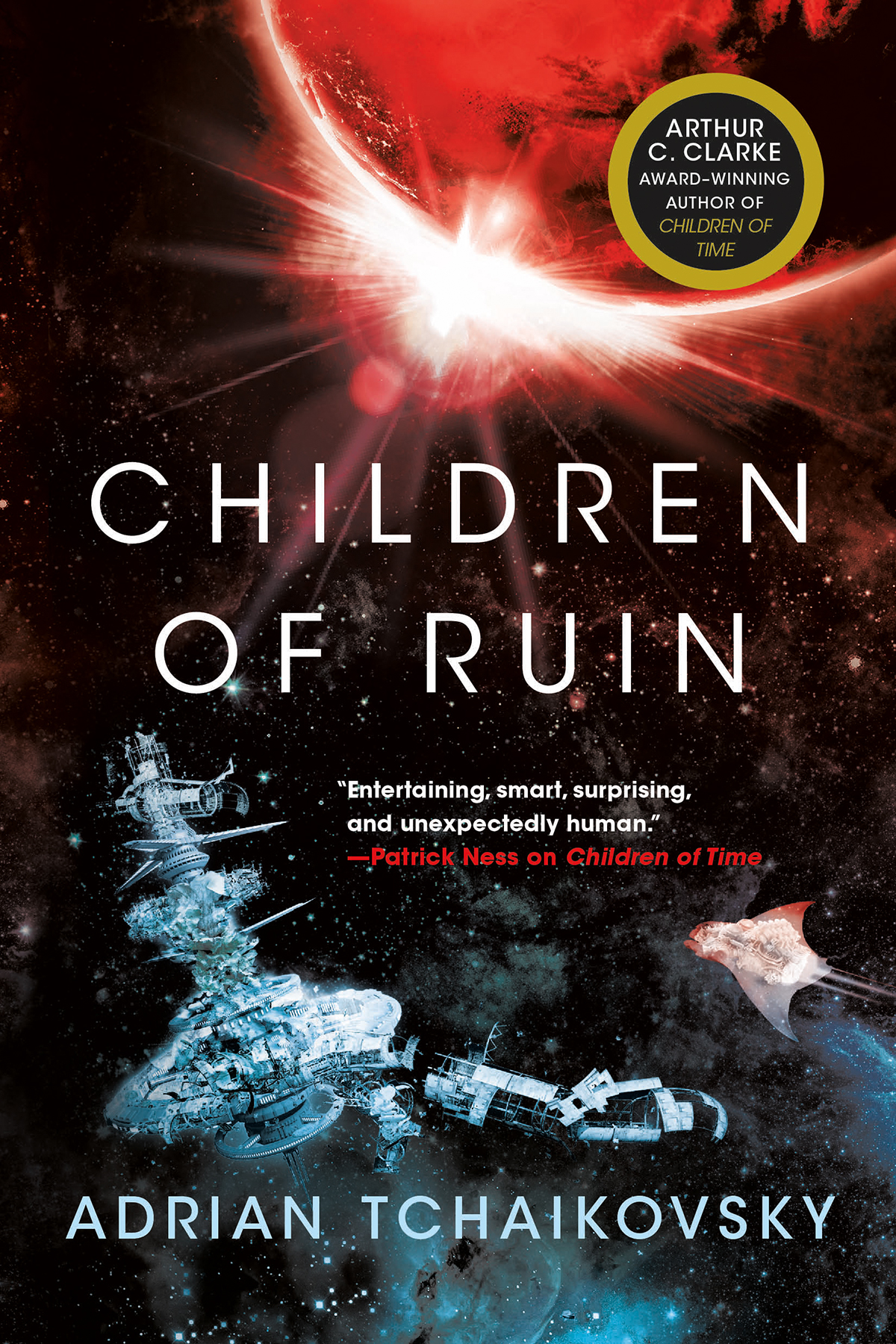This book is a work of fiction. Names, characters, places, and incidents are the product of the authors imagination or are used fictitiously. Any resemblance to actual events, locales, or persons, living or dead, is coincidental.
Copyright 2019 by Adrian Czajkowski
Excerpt from Red Moon copyright 2018 by Kim Stanley Robinson
Excerpt from Rosewater copyright 2016 by Tade Thompson
Author photo by Ante Vukorepa
Cover images by Shutterstock
Hachette Book Group supports the right to free expression and the value of copyright. The purpose of copyright is to encourage writers and artists to produce the creative works that enrich our culture.
The scanning, uploading, and distribution of this book without permission is a theft of the authors intellectual property. If you would like permission to use material from the book (other than for review purposes), please contact permissions@hbgusa.com. Thank you for your support of the authors rights.
Orbit
Hachette Book Group
1290 Avenue of the Americas
New York, NY 10104
orbitbooks.net
Simultaneously published in Great Britain by Macmillan and in the U.S. by Orbit in 2019
First U.S. Edition: May 2019
Orbit is an imprint of Hachette Book Group.
The Orbit name and logo are trademarks of Little, Brown Book Group Limited.
The publisher is not responsible for websites (or their content) that are not owned by the publisher.
The Hachette Speakers Bureau provides a wide range of authors for speaking events. To find out more, go to www.hachettespeakersbureau.com or call (866) 376-6591.
Library of Congress Control Number: 2019930327
ISBNs: 978-0-316-45253-3 (trade paperback), 978-0-316-45254-0 (ebook)
E3-20190420-JV-NF-ORI
A novel of sublime plot twists and spectacular set pieces, all underpinned by great ideas. And it is crisply modernbut with the sensibility of classic science fiction. Asimov or Clarke might have written this. A hugely satisfying sequel.
Stephen Baxter on Children of Ruin
Magnificent. This is the big stuffthe really big stuff. Rich in wisdom and Humanity (note the H), with a Stapledonian sweep and grandeur. Books like this are why we read science fiction.
Ian McDonald on Children of Ruin
Children of Ruin is wonderfulbig, thinky SF that feels classic without being mired in the past, absolutely crammed with fun ideas. Anyone who likes sweeping, evolutionary-scale stories will love this.
Django Wexler
A refreshingly new take on post-dystopia civilizations, with the smartest evolutionary world-building youll ever read.
Peter F. Hamilton on Children of Time
Children of Time is a joy from start to finish. Entertaining, smart, surprising and unexpectedly human.
Patrick Ness
Brilliant science fiction and far-out world-building.
James McAvoy on Children of Time
This is superior stuff, tackling big themesgods, messiahs, artificial intelligence, aliennesswith brio.
Financial Times on Children of Time
Packed with ingenious ideas classic widescreen space opera.
New Scientist on Children of Time
An enormously interesting and well drawn SF novel that asks some tough questions and makes interesting extrapolations.
SF Signal on Children of Time
Tchaikovsky is a phenomenal author, a modern powerhouse of fiction. Speculative fiction at its best.
Starburst magazine on Dogs of War
A timely warning about the dangers of artificial intelligence and super weapons in the hands of unscrupulous powers.
Guardian on Dogs of War
S HADOWS OF THE A PT
Empire in Black and Gold
Dragonfly Falling
Blood of the Mantis
Salute the Dark
The Scarab Path
The Sea Watch
Heirs of the Blade
The Air War
War Masters Gate
Seal of the Worm
E CHOES OF THE F ALL
The Tiger and the Wolf
The Bear and the Serpent
The Hyena and the Hawk
Guns of the Dawn
Children of Time
Children of Ruin
To Paul
If you can look into the seeds of time,
And say which grain will grow and which will not
William Shakespeare, Macbeth
So many stories start with a waking. Disra Senkovi had been asleep for decades. Something like a lifetime passed back home while he slumbered; a fraction of a lifetime passed around his oblivious form, the timespan squeezed down the relativity gradient by his proximity to the speed of light. For him, though, there was no time, nothing but the oblivion of the cold-sleep chamber. They knew how to build them back in those days.
Senkovi chose the manner of his waking. Some of his colleaguesthose he thought of as less imaginativewould let themselves be fed crucial mission information, news from home, metrics from the ship, so they could spring from cold sleep with a mind full of data, ready to leap to their stations and steal a march on the day. Ludicrous, given the work they had ahead of them would take decades. Senkovi had always been unimpressed by most of his colleagues.
Instead, paradoxically, he woke himself with a dream.
He hung in the water of a warm, clean Coral Sea that hadnt existed in that virgin state since long before his birth. The sun filtered down through the waters like an embarrassment of sapphires. Below him, his best-guess reconstruction of the vanished Great Barrier Reef extended in multicoloured profusion, reds, purples and greens as far as the eye could see, like an alien city. Life whirled about the coral metropolis in a riot of motion, swimming, jetting, drifting, crawling. He turned gently, casting a benign and godlike gaze over his creation, half-sleeping, half-knowing, so that he felt the joy of having brought this into being yet not the pain of knowing the original had long predeceased him.
At last, one of his special friends signalled its presence, squirming its malleable body from a crevice within the rocks and undulating cautiously towards him. Eyes like and unlike his own regarded him with the sort of ersatz wisdom nature otherwise gave only to owls. Itdetermining the gender of an octopus was not a task easily performed at this removereached an arm towards him, Adam to his divinity, and he let his hand drift outwards slowly to accept that touch.
It was a good dream. Hed programmed it himself, creating a complex sequence of mental stimulation that drew on his specific memories and jumbled them into something semi-novel. It was still dream like, unreal, but that was what he was aiming for, so, fine. He also had to hack the ship computers with considerable ingenuity to make it happen, given that encounters with marine fauna were not on the -la-carte menu when choosing a wake-up sequence. The hard part had not been inserting the neurological sequence into the ships database but erasing all sign of his meddling. By then hed been in and out of the mission systems quite a lot without anyone noticing, though. Senkovi had come to the conclusion that the Terraform Initiative back home was very, very lax in its digital security, and then shrugged idly and carried on with his own personal tinkering. What, after all, was the worst that could happen?


